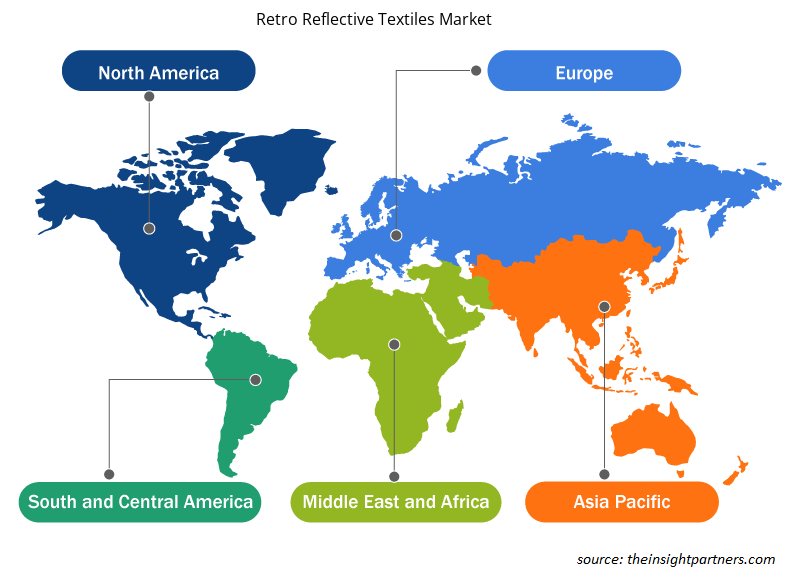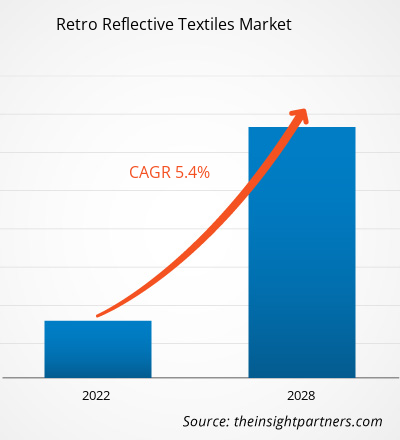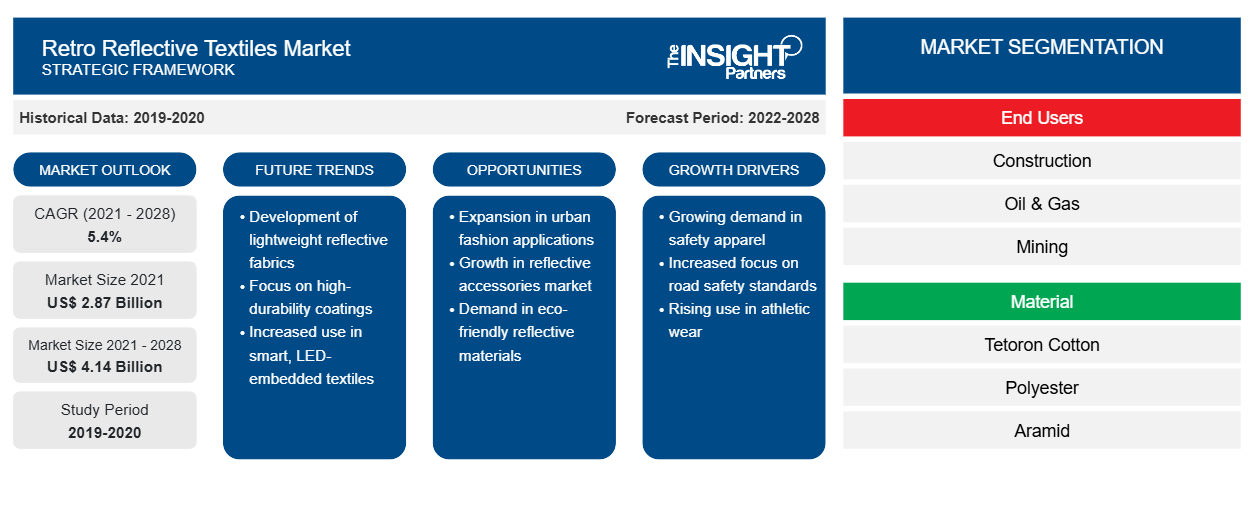[Informe de investigación] Se espera que el mercado de textiles retrorreflectantes crezca de US$ 2.872,8 millones en 2021 a US$ 4.139,8 millones en 2028; se estima que crecerá a una CAGR del 5,4% entre 2021 y 2028.
El tejido retrorreflectante se fabrica con pequeñas perlas de vidrio que reflejan la luz hacia la fuente. Se utiliza mucho en ropa de protección en industrias como la construcción y el transporte. La demanda de textiles retrorreflectantes ha aumentado debido a las normas de seguridad impuestas por varios gobiernos. Además, el creciente número de accidentes en las industrias de los usuarios finales, como la industria minera, ha impulsado la demanda de textiles retrorreflectantes.
En 2020, Asia Pacífico tuvo la mayor participación del mercado mundial; se estima que registrará la CAGR más alta durante el período de pronóstico. India, China y Japón se encuentran entre los principales accionistas del mercado. El alto crecimiento de industrias, como la automotriz, el transporte, la construcción y la infraestructura, impactó significativamente en el mercado de textiles retrorreflectantes de APAC . La industria de la construcción y la infraestructura está creciendo en Asia Pacífico.
Personalice este informe según sus necesidades
Obtendrá personalización en cualquier informe, sin cargo, incluidas partes de este informe o análisis a nivel de país, paquete de datos de Excel, así como también grandes ofertas y descuentos para empresas emergentes y universidades.
-
Obtenga las principales tendencias clave del mercado de este informe.Esta muestra GRATUITA incluirá análisis de datos, desde tendencias del mercado hasta estimaciones y pronósticos.
Impacto de la pandemia de COVID-19 en el mercado de textiles retrorreflectantes
En 2021, las economías comenzaron a reactivar sus operaciones, lo que tuvo un impacto positivo en el mercado global. También se prevé que la demanda de textiles retrorreflectantes aumente significativamente para diferentes aplicaciones, como la fabricación de ropa de seguridad. Además, los fabricantes pueden operar a plena capacidad para superar la brecha entre la oferta y la demanda. Además, muchos ciudadanos de varias naciones están completamente vacunados y los gobiernos de diferentes países están realizando inversiones en los sectores de la construcción, la infraestructura y la fabricación. Se espera que el crecimiento de varias industrias de uso final resulte en una alta demanda de textiles retrorreflectantes durante el período de pronóstico.
Perspectivas del mercado
Creciente importancia de las medidas de seguridad en el lugar de trabajo y de la indumentaria de seguridad de alta visibilidad ( HVSA )
Los accidentes y las muertes son cada vez más comunes en lugares de trabajo, como carreteras en sitios de construcción, industrias de petróleo y gas, industrias químicas y sitios mineros, donde la baja visibilidad es un problema. La maquinaria pesada, incluidas las grúas, se utiliza con frecuencia en áreas industriales. Los trabajadores que carecen de equipo de protección tienen más probabilidades de sufrir accidentes, lesiones y muertes, ya que los operadores de dicha maquinaria pesada no pueden detectarlos fácilmente. Además, millones de trabajadores son propensos a sufrir golpes, atropellos y atropellos mientras trabajan cerca del tráfico y de equipos de construcción. Se espera que la creciente importancia de la seguridad en el lugar de trabajo impulse el crecimiento del mercado de textiles retrorreflectantes durante el período de pronóstico.
Información para el usuario final
Según el usuario final, el mercado global está segmentado en construcción, petróleo y gas, minería, transporte, bomberos, agencias de aplicación de la ley y otros. En 2020, el segmento de la construcción representó la mayor participación en los ingresos; se espera que crezca a la CAGR más alta durante el período de pronóstico. El sitio de construcción está creciendo con la rápida urbanización, lo que genera muchos problemas ambientales de base térmica representados por la isla de calor urbana. Estos reflectores se utilizan en letreros, ropa de personal y vehículos en los sitios de construcción. Los textiles retrorreflectantes se han sugerido como una solución innovadora para reducir la energía necesaria para la refrigeración y mejorar los microclimas urbanos . Los materiales textiles retrorreflectantes mejoran la visibilidad y son materiales accesorios esenciales. Además, un rápido aumento en las actividades de construcción e infraestructura condujo a un aumento en el uso de letreros y señalización vial de color, lo que impulsa el crecimiento del mercado. El principal impulsor del mercado de textiles retrorreflectantes es la inversión a gran escala en el sector de la construcción y la infraestructura.
Entre los actores que operan en el mercado de textiles retrorreflectantes se encuentran 3M; Daoming Optics & Chemical Co., Ltd; Hangzhou Chinastars Reflective Material Co., Ltd; Huangshan Xingwei Reflectorized Material Co., Ltd.; PS ENTERPRISES; Swicofil AG; Unitika Sparklite Ltd.; YGM Reflective; HJ Corp; y HIGHVIZ . Estas empresas ofrecen una amplia gama de carteras de productos para el mercado. La presencia de estas empresas en las regiones en desarrollo ofrece oportunidades lucrativas para el mercado de textiles retrorreflectantes. Los actores del mercado están desarrollando productos innovadores y de alta calidad para satisfacer los requisitos de los clientes.
Perspectivas regionales del mercado de textiles retrorreflectantes
Los analistas de Insight Partners explicaron en detalle las tendencias y los factores regionales que influyen en el mercado de textiles retrorreflectantes durante el período de pronóstico. Esta sección también analiza los segmentos y la geografía del mercado de textiles retrorreflectantes en América del Norte, Europa, Asia Pacífico, Oriente Medio y África, y América del Sur y Central.

- Obtenga datos regionales específicos para el mercado de textiles retrorreflectantes
Alcance del informe de mercado de textiles retrorreflectantes
| Atributo del informe | Detalles |
|---|---|
| Tamaño del mercado en 2021 | US$ 2.87 mil millones |
| Tamaño del mercado en 2028 | US$ 4,14 mil millones |
| CAGR global (2021-2028)CAGR (2021 - 2028) | 5,4% |
| Datos históricos | 2019-2020 |
| Período de pronóstico | 2022-2028 |
| Segmentos cubiertos |
Por los usuarios finales
|
| Regiones y países cubiertos |
América del norte
|
| Líderes del mercado y perfiles de empresas clave |
|
Densidad de actores del mercado de textiles retrorreflectantes: comprensión de su impacto en la dinámica empresarial
El mercado de textiles retrorreflectantes está creciendo rápidamente, impulsado por la creciente demanda de los usuarios finales debido a factores como la evolución de las preferencias de los consumidores, los avances tecnológicos y una mayor conciencia de los beneficios del producto. A medida que aumenta la demanda, las empresas amplían sus ofertas, innovan para satisfacer las necesidades de los consumidores y aprovechan las tendencias emergentes, lo que impulsa aún más el crecimiento del mercado.
La densidad de actores del mercado se refiere a la distribución de las empresas o firmas que operan dentro de un mercado o industria en particular. Indica cuántos competidores (actores del mercado) están presentes en un espacio de mercado determinado en relación con su tamaño o valor total de mercado.
Las principales empresas que operan en el mercado de textiles retrorreflectantes son:
- 3M
- Daoming Óptica y Química Co., Ltd.
- MATERIAL REFLECTANTE DE HANGZHOU CHINASTARS CO.,LTD
- Huangshan Xingwei Reflectorized Material Co., Ltd
- PROMOCIÓN
Descargo de responsabilidad : Las empresas enumeradas anteriormente no están clasificadas en ningún orden particular.

- Obtenga una descripción general de los principales actores clave del mercado de textiles retrorreflectantes
Informe Destacado
- Tendencias progresivas de la industria en el mercado para ayudar a los actores a desarrollar estrategias efectivas a largo plazo
- Estrategias de crecimiento empresarial adoptadas por los mercados desarrollados y en desarrollo
- Análisis cuantitativo del mercado de textiles retrorreflectantes de 2019 a 2028
- Estimación de la demanda mundial de textiles retrorreflectantes
- El análisis de las cinco fuerzas de Porter ilustra la eficacia de los compradores y proveedores que operan en la industria
- Avances recientes para comprender el escenario competitivo del mercado
- Tendencias y perspectivas del mercado, así como factores que impulsan y restringen el crecimiento del mercado de textiles retrorreflectantes
- Asistencia en el proceso de toma de decisiones destacando las estrategias de mercado que sustentan el interés comercial y conducen al crecimiento del mercado.
- El tamaño del mercado en varios nodos
- Descripción detallada y segmentación del mercado, así como la dinámica de la industria de textiles retrorreflectantes
- Tamaño del mercado de textiles retrorreflectantes en varias regiones con prometedoras oportunidades de crecimiento
El "Análisis del mercado global de textiles retrorreflectantes hasta 2028" es un estudio especializado y profundo de la industria de productos químicos y materiales con un enfoque especial en el mercado global de textiles retrorreflectantes. El informe tiene como objetivo proporcionar una descripción general del mercado con una segmentación detallada del mercado. El mercado de textiles retrorreflectantes está segmentado en función de los usuarios finales, el material y la geografía. Según los usuarios finales, el mercado de textiles retrorreflectantes se segmenta en construcción, petróleo y gas, minería, transporte, bomberos, agencias de aplicación de la ley y otros. Según el material, el mercado está segmentado en algodón tetoron, poliéster, aramida y otros. Por geografía, el mercado de textiles retrorreflectantes está ampliamente segmentado en América del Norte, Europa, Asia Pacífico (APAC), Medio Oriente y África (MEA) y América del Sur y Central.
Perfiles de empresas
- 3M
- Daoming Óptica y Química Co., Ltd.
- Material reflectante de Hangzhou Chinastars Co., Ltd.
- Huangshan Xingwei Material Reflectorizado Co., Ltd.
- EMPRESAS PS
- Swicofil AG
- Unitika Sparklite Ltd.
- YGM Reflectivo
- Corporación HJ
- ALTA VISIBILIDAD
- Análisis histórico (2 años), año base, pronóstico (7 años) con CAGR
- Análisis PEST y FODA
- Tamaño del mercado, valor/volumen: global, regional y nacional
- Industria y panorama competitivo
- Conjunto de datos de Excel
Informes recientes
Testimonios
Razón para comprar
- Toma de decisiones informada
- Comprensión de la dinámica del mercado
- Análisis competitivo
- Información sobre clientes
- Pronósticos del mercado
- Mitigación de riesgos
- Planificación estratégica
- Justificación de la inversión
- Identificación de mercados emergentes
- Mejora de las estrategias de marketing
- Impulso de la eficiencia operativa
- Alineación con las tendencias regulatorias























 Obtenga una muestra gratuita para - Mercado de textiles retrorreflectantes
Obtenga una muestra gratuita para - Mercado de textiles retrorreflectantes